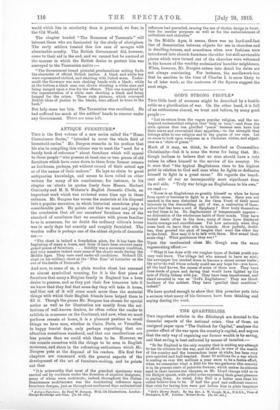GOD'S STRONG PEOPLE,*
Tars little book of sermons might be described by a hostile critic as a glorification of war. On the other hand, it is full of an enthusiasm shared, we trust and believe, by many good people :- "Let us return from the vague popular religion, and the un- inspired ecclesiastical religion that help in vain,'—and from the civic opinion that has glorified ' peace' because men have lost their nerve and overvalued their appetites,—to the strength that belongs alike to our religion and to the genius of our race. Let us cease to look upon weakness as a Christian virtue, and abject- ness as a state of grace.'" Much of it may, we think, be described as Cromwellian Christianity—but it is none the worse for being that. Mr. Gough inclines to believe that no man should have a ;vote unless he offers himself to the service of his oountry. He is sure that "the typical Englishman rises to his highest point in relation to God and man when he fights or dedicates himself to fight in a great cause." He regards the benefi-
cent aide of war as incomparably more significant than its evil side. " Truly war brings an Englishman to his own," we read :—
" Never is an Englishman so greatly himself as when he turns from sport or business to fight in a noble cause. Have you not marked in the men disturbed in the Cana Feast of their usual interests by the discomfiting call of war, a realization of them- selves that has been a sort of Epiphany P How truly themselves we feel them to be. No dimplacoment of temperament appears— no dislocation of the wholesome habit of their minds. They have looked death often in the face; many of them have displayed heroic courage and unselfishness. Yet how naturally when they come back on leave they ride to hounds. How joyfully, doubt- less, they greeted the pack of beagles that went the other day to the front. How easy it is to talk with them. How sound their souls ring I What gentlemen they are I"
Upon the uneducated class Mr. Gough sees the same regenerating effect :-
"What it has done with our rougher types of British youth you very well know. The village lad who seemed to have no soul ; the newspaper boy marked down to become a street corner loafer ; the ne'er-do-well whom nobody could see any hope for—you know, all the land knows, the names of some of them now. They have done deeds of grace and daring that would have lighted up the eyes of Philip Sidney with joy. They have been transformed, and stand revealed in war as ' God's Englishmen.' rhey are blood- brothers of the noblest. They have gentled their condition' indeed."
We have quoted enough to show that this preacher puts into a sermon what many of his listeners have been thinking and saying during the week.


































 Previous page
Previous page